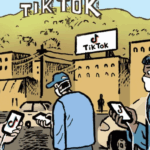It’s been a heck of a couple of months for Mark Read.
The Wunderman CEO was promoted to co-chief operating officer of WPP in April after then-CEO Martin Sorrell stepped down amid an investigation into misuse of company funds. Read shares his role with Andrew Scott, WPP’s COO for EMEA, who focuses on the commercial and financial aspects of the business while Read sets his sights on employees and clients.
They’ve got their work cut out.
Under Sorrell’s leadership, WPP tried to transform its mammoth organization into a less complex and siloed company. Now that incomplete task falls to Read and Scott, who are working to foster collaboration across WPP and make the company easier for clients to navigate – all while getting back to growth in a slow environment.
“Clearly, we need to adapt what we do in more radical ways,” Read told AdExchanger. “But I think there’s a very bright future for WPP and for our peers. I’m not in any way negative about the future for the holding companies.”
Meanwhile, WPP’s board is searching for a new CEO to replace the company’s legendary founder and only-ever CEO of three decades. Read is keen to get the job.
“WPP is a great company,” he said. “Who wouldn’t want to run it if they had the opportunity?”
Read spoke with AdExchanger at Cannes Lions about what’s on the horizon for WPP.
AdExchanger: How disruptive has Sorrell’s exit been at WPP for employees and clients?
MARK READ: We’re really just focused on the future. Universally, clients are very supportive of WPP, the work that we’re doing and the teams that work on their businesses.
What is the future of WPP?
To take advantage of all of the opportunities opened up by new technology and ways of communicating with consumers. That doesn’t mean we become a technology company. We’ll still be a business that’s interested in ideas and creativity and can help our clients grow. But we need to understand how to use technology and data in our work, so that the technology is in service of the idea.
Do WPP agencies not know how to use technology and data?
It’s a process and we have to continue to invest and innovate and adapt.
They have a very good understanding of where the industry is heading and the role of technology. We have to be world-class in helping our clients understand how to get the most value from Google and Facebook, how to manage the transition to programmatic – which I think will increasingly be the way we buy all media – and to run universal operations more efficiently. So, we need to look at how we use technology and partner with parts of the industry to do that.
What needs to happen to get WPP back to growth?
We need to focus on what always makes us successful: doing great work for clients. If we do that, then we’ll gain share and grow. It’s about adapting our offer and shifting resources from things that clients want to buy less of to the things they want to buy more of.
What do clients want to buy less of?
Traditional television and press advertising. They want to focus more on digital marketing, public relations and social media and on building their own channels to communicate with customers.
There’s much more emphasis on owned and earned media … on how they can build direct relationships and sell through those direct relationships, all of which are tremendous growth opportunities to WPP. We have very strong capabilities in commerce, so we can help clients solve a lot of problems.
WPP agencies are on separate P&Ls. Does that disincentivize them to collaborate?
There’s no single answer to the collaboration question. It’s about leadership. We need more leaders with a greater understanding of data and technology who are focused on creating a new generation of a media strategy organization. Incentives play a role and physical location plays a role. It requires us to be a bit more radical in how we think about collaboration.
Sometimes we need to leave our agency brands at the door and think about the client and less about ourselves. But I don’t think that needs to be at the expense of the agency brands. Ultimately, that’s where people come to work.
Every business needs a P&L to manage itself efficiently. But, if we look back at WPP in five years, we’ll find a different organization. It will be simpler to navigate, more data-driven and more technologically competent. But there’s no silver bullet to this.
There’s a lot of talk about WPP divesting some of its less profitable assets. Is WPP too big?
I don’t think so. We need to look at our investments, but it’s not about being smaller. It’s about being simpler to manage. We’re focused on organizing around our clients and countries where we have great depth of talent. [The question is] how do we bring that to bear collectively in local markets?
How is the board measuring your success?
The board is focused on the performance and strategy of the organization and deciding on who the right person is to be CEO and lead the company in the future.
How close are you to finding a new CEO?
They haven’t given a deadline. Roberto [Quarta, chairman of WPP,] described it as “well advanced” at the annual general meeting last week.
This interview has been edited and condensed.















